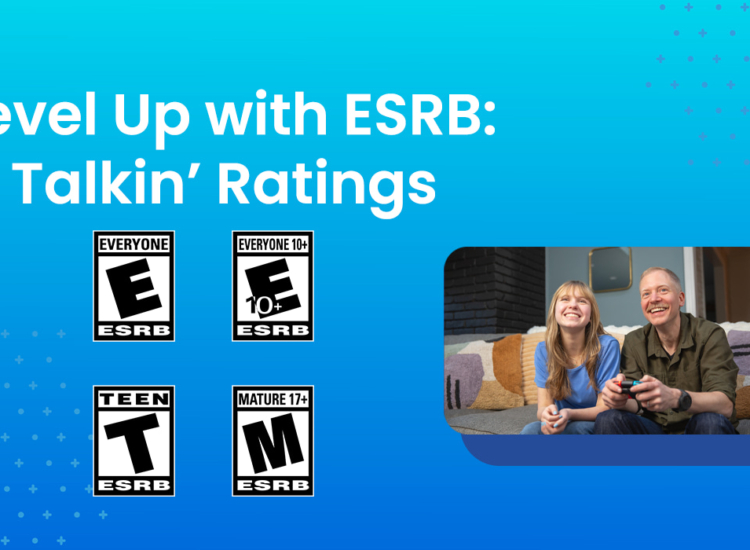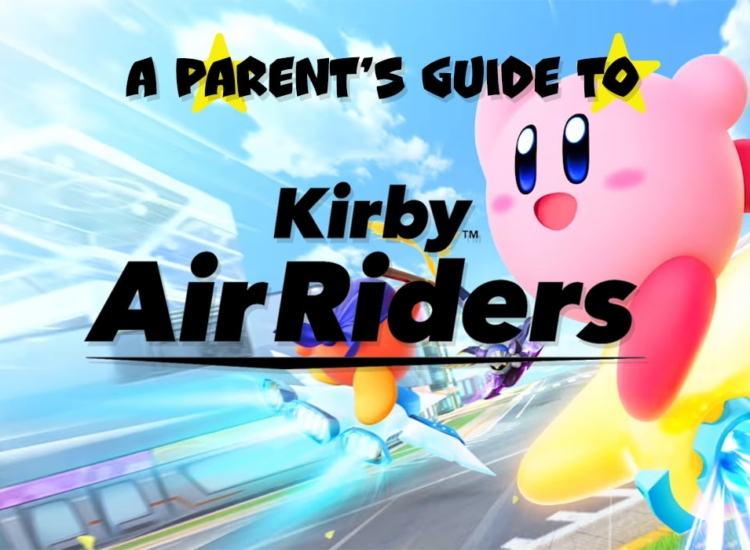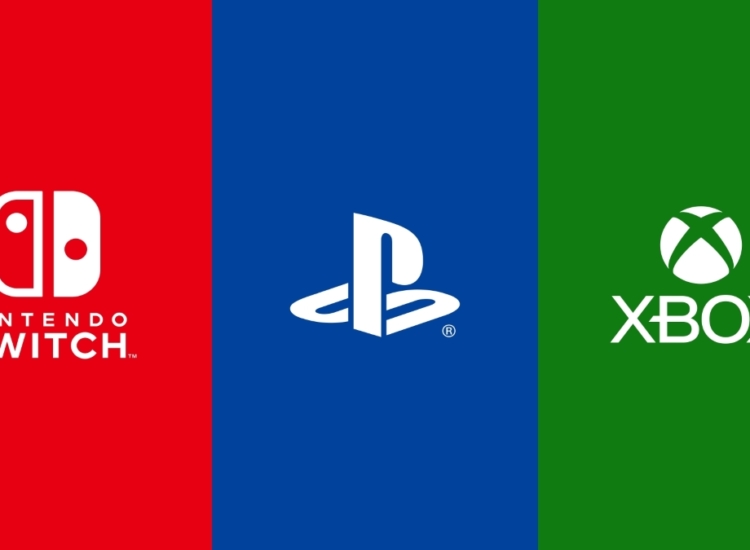What Parents Need to Know About Discord
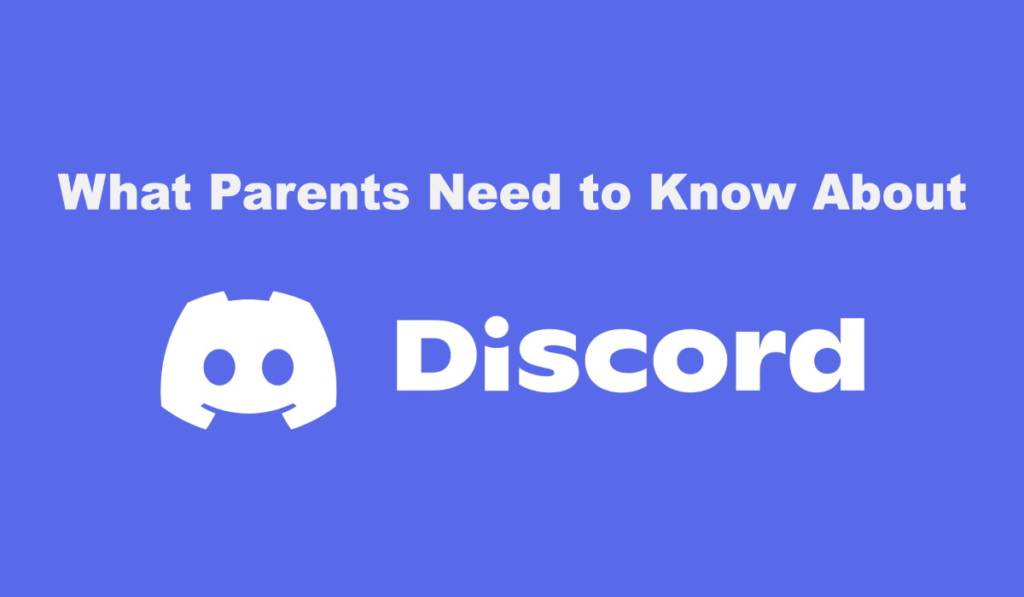
Updated March 19, 2025 – More than 200 million people use Discord each month, and if you’re a parent chances are your kids are among them. Discord’s explosive popularity is primarily fueled by teens and adults of all ages who flock to its platform to connect while playing games, do homework together, hold club meetings, sing karaoke, or just hang out.
At its core, Discord helps facilitate socialization among peers, especially at times when it’d be otherwise impossible to do so in person. It’s a versatile, simple, and efficient platform that allows users to interact however they choose (text, video, audio, etc.). While people of all ages use Discord, it has become a key part of many kids’ social lives.
If you’re intrigued about Discord and how your kids may use it to socialize, the following will help you learn the basics about Discord. This, of course, includes how you can make sure your kids stay safe while navigating the platform.
What is Discord?
Discord is a free social communications platform that lets users text, talk, video chat, and share screens with one another. It was initially used largely by gamers (and still is), but over the years it’s spread to other groups thanks to its ease-of-use and wide variety of useful functions. Users now leverage Discord for all manner of personal and professional virtual gatherings, including hosting book clubs, knitting groups, sewing circles, and more.
Even with Discord’s expansion into other enthusiast circles, gamers continue to dominate its user base.
How is Discord Different from Other Social Media Platforms?
One of Discord’s biggest differentiators is that it has no traditional ads. Instead, Discord offers advertisers something called “Quests,” which are essentially promoted ads that encourage users to engage with a specific game. This can include something like playing a game for a certain amount of time (a “Play Quest”) or watching a brief video (a “Video Quest”). The difference between these and an ad you may find on a free-to-play mobile game is that they then reward the player with an in-game goody (in-game currency, etc.). It is entirely up to the user as to whether to engage with Quests or to ignore them.
However, much like other social platforms, Discord does collect user data, which is outlined in their privacy policy. This may not be a dealbreaker for most parents, but we always recommend checking the platform’s privacy policy to learn what personal information on your child is being collected, shared and/or retained..
Discord does not have a feed in the way many other social platforms do. Instead, users can engage with either public or private spaces. As implied by the name, the public servers (communities organized around a specific topic or group) are accessible to anyone, meaning whatever your kids post can be seen by anyone that happens across that space. Meanwhile, private servers are only accessible to approved users, giving your kids the opportunity to set up their own servers for people they know, or joining their friends’ servers. This makes Discord a more personally curated platform.
Discord does offer a subscription called Nitro. Nitro (or Nitro Basic) provides users various enhancements to their experiences on the platform, such as custom emojis, special reactions, HD streaming, and more. It is not mandatory to subscribe to either tier of Nitro to enjoy the platform.
Discord’s Vocabulary
Discord can be tricky for the uninitiated. Thankfully, there’s a glossary, as well as numerous beginner’s guides, including a regularly updated official guide from Discord, an unofficial guide from PCWorld, and a manual put together by M.I.T. students on how to use Discord to collaborate with classmates on projects.
Some terms you may hear are:
- Server: Spaces where users can gather and communicate. Servers can be started by communities and friend groups and can be either public (meaning anyone can join) or invitation only. Any user can start a new server for free.
- Channel: Servers are organized into text and voice channels through which users can communicate. These are usually more limited in scope and dedicated to specific topics.
- DMs: Short for “direct message”. These are private messages (via text, voice, or video) sent directly from one user to another.
- GDMs: This is short for “group direct message”. While direct messages are between two people, users can invite others to a private conversation of up to 10 people. Users cannot join a conversation unless they are invited.
Can Children Use Discord?
Discord’s Terms of Service states that only users who are 13 years or older may use its service in the U.S. If a user is reported as being under 13, Discord will lock the user out of their account until they can verify their age with an official ID.
Make sure your kids know to never, ever lie about their age when signing up for Discord or any other platform! It may be helpful to explain to them that this is not about denying them access to something, but rather making sure that they stay safe online and that their data remains protected. For more on why this is the case, visit ESRB’s Privacy Tips For Parents section in our Family Gaming Guide.
Can Strangers Interact With My Children on Discord?
It depends on your child’s account settings. When your kids join a server, others in that server can send them direct messages. You can, however, disable this feature in the account settings under the Privacy & Safety tab (see more details below). You can also select who can send your child a friend request, for example, you can choose everyone, friends of friends, or only other server members.
Discord recommends that users accept friend invites only from people they know. Keep in mind that users do not have to use their real names on Discord, so it may take one extra step to confirm who’s sending an invite. There’s also an option to scan messages and delete those that have explicit content. Should your kids ever encounter someone behaving inappropriately, Discord allows you to block the person in question, which prevents them from sending your kids direct messages and hides their messages in any shared servers. You can also create an invite-only server and invite only people you or your children know personally.
Should your kids ever interact with someone behaving abusively (i.e., violating Discord’s Community Guidelines, Terms of Service, etc.) you can also report them. Remember to include screenshots of the incident if possible so the team at Discord can manage the report efficiently.
How Can I Help Ensure My Kids Use Discord Safely?
Discord’s Family Center helps parents manage and monitor how their kids use the platform. Using the Family Center will help you gain insight into your kids’ activity on the platform, but it will not provide a transcript of your kids’ conversations with others. According to Discord, the goal is to help you understand how your kids use the platform and to nurture an open-ended dialogue on appropriate/safe online behavior. As such, this is an opt-in tool, meaning both you and your kids must agree to be part of it.
To sign up for the Family Center you first need to create your own Discord account. After that, your kids need to first share a QR code with you to begin the process. Once you scan that code, your child(ren) will be prompted to accept the connection and the Family Center will begin recording and reporting information, including:
- Recently added friends
- Which users your kids have messaged or called in both direct messages and group messages
- Servers your kids have joined or participated in
You can also receive weekly activity reports via email that highlight whom your kids have messaged and/or called, how many new friends they have (and who they are), the servers they’ve joined, and more. Discord notes that the Family Center will not include a “complete archive of activity” and will only populate activity occurring after your kids have opted into the tool.
Discord also has safety and privacy settings to help manage what is visible to other users and how they can engage. The chart below highlights many of these features, as well as how you can activate them:
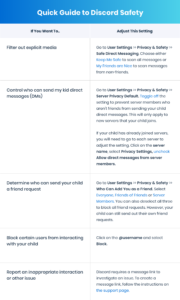
It’s important to remember that anyone with access to a Discord account login can change the settings at any time, including your kids. Even if you activate these settings on your kids’ Discord account, they can deactivate them without your permission. Additionally, Discord emphasizes in its safety FAQ that it will not share user login details with parents who request access to their kids’ accounts. So, you’ll have to get access from your kids directly.
For additional information on the Family Center, safety settings, privacy, and more you can visit Discord’s Parent Hub.
Is There Inappropriate Content on Discord?
As with any social media platform with user-generated and contributed content, Discord can contain content that’s inappropriate for kids. The platform’s community guidelines require that servers with adult content include an “age-restricted” label. Users under the age of 18 are automatically barred from accessing servers with the “age-restricted” label.
Discord’s guidelines also prohibit harmful misinformation and in some cases examine off-platform behavior when assessing if a user has violated the guidelines. According to Discord, this is part of an ongoing effort to make sure the platform stays safe for its users.
Discord provides training materials for its users on how to moderate communities, while also spending resources to monitor and enforce compliance with its guidelines across the platform. In fact, every six months, it releases a Transparency Report highlighting how many users were reported for community guidelines violations, why the reports were submitted (harassment, spam, cybercrime, graphic content, etc.), the actions taken by the trust and safety team, and more.
What Else Can Parents Do to Monitor What Their Kids Are Doing on Discord?
As with all social media and online game platforms, parents should nurture an ongoing, open conversation with each of their kids about their use of those platforms. Showing interest by regularly checking in and asking them to share what they’re doing on Discord in a non-judgmental way is not only a great way to understand how the platform works and how your kids are using it, but also better understand any potential risks.
For more information and tips about how you can help protect your kids’ personal information visit our Family Gaming Guide.
 Patricia E. Vance is the president of the Entertainment Software Rating Board (ESRB). In her position, she leads the teams responsible for assigning age and content ratings to video games and apps, enforcing marketing guidelines adopted by the video game industry, and operating ESRB Privacy Certified, an FTC-sanctioned COPPA Safe Harbor Privacy seal certification program.
Patricia E. Vance is the president of the Entertainment Software Rating Board (ESRB). In her position, she leads the teams responsible for assigning age and content ratings to video games and apps, enforcing marketing guidelines adopted by the video game industry, and operating ESRB Privacy Certified, an FTC-sanctioned COPPA Safe Harbor Privacy seal certification program.
